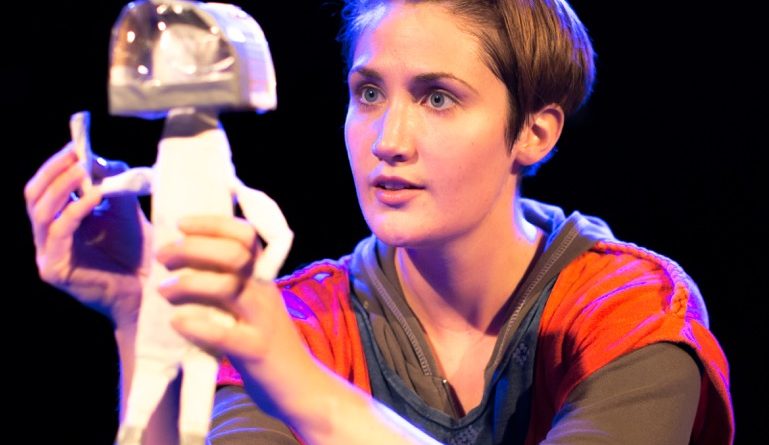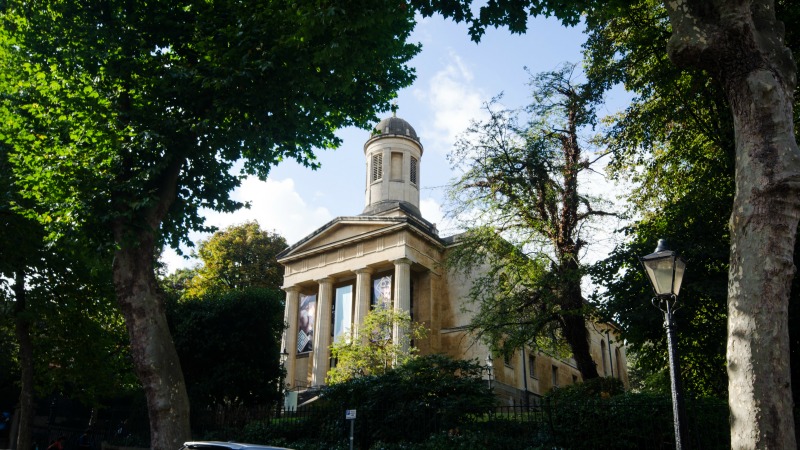Interview with Tessa Bide
A Strange New Space is the new show by theatremaker Tessa Bide, following The Tap Dancing Mermaid, Arnold’s Big Adventure and The Melody Makers. It’s a non-verbal one-woman show following the journey of a child refugee, told in the metaphor of a space adventure. Made with support from Arts Council England, The Trinity Centre, May Park Primary School, the Integrate UK charity and Circomedia.
We ask Tessa all about the show …
We’re looking forward to catching A Strange New Space at Circomedia this April. Tell us what it’s about:
Tessa Bide: The show is about a young girl called Amira who is obsessed with space. At the start of the show, we see Amira have to leave her home and she recounts her journey to the audience as a space adventure, with glimpses into her reality peaking through the gaps. It’s really about the power of the imagination to conquer adversity – all Amira has to tell her story is a cardboard box and a few items in her bag – two dolls/puppets, a water bottle, bowl, colouring book and some bike lights. These become a myriad of other characters and props during the show, facilitated by the audience’s imagination.
Who is Amira, the star of the show? Is she based on a real person?
TB: Amira is a fictional character, based on lots of real children I met when I visited Greece in January to volunteer in refugee camps and squats. She has quite a tough, fairly nonchalant exterior when we first meet her but inside is a kid just wanting to play and feel safe. She’s a great character to play in a children’s show – when she first meets the audience she takes a while to warm to them and trust them – it’s a narrative thread all through the show. Normally you come out smiling and waving from the first minute to win the audience straight away in children’s shows. It’s really satisfying building a really tight relationship with the audience throughout the show, it feels more genuine.
Amira is searching for a safe place. Why? How does she feel?
TB: At the start of the show we see Amira’s house destroyed and her Mum disappears with it. This is told in puppet-scale which is a really useful device for tackling these difficult scenes/topics. We see her search for her Mum along the horizon but then she looks up, thinking “right, if she’s not down here, I’m going to have to go up there”. As she goes, she’s searching for safety and there’s a glimmer of hope she might find her Mum along the way.
You volunteered in the refugee camps of Greece to research the crisis there. Who did you meet? And how did it help in the making of this new production?
TB: I met dozens of incredible children, adults and volunteers, it was a really emotional experience. It massively informed the show – it educated me about what might be a triggering scene for these children if they were to watch it (which is one of my aims with the show) and made me really conscious of not making light of their experiences and journeys. I met one little girl who I taught the ukulele to and she’d spent 13 hours on a boat en route to Greece, with a 2 week old baby sister. Before I’d met her, we had a ‘sea’ scene in the show where Amira is on a boat and it starts out pleasant but then becomes more choppy and distressing. After meeting the children who had undergone these unimaginably traumatic sea-journeys we knew we had to deal with it very sensitively so we overhauled that whole section.
Why did you choose not to include dialogue in A Strange New Space?
TB: My aim with the show is to tour it internationally – both for my own professional development and to reach communities of displaced people all over the world. Having no words means it’s much more accessible to these non-English speakers. It’s also a lovely challenge as a theatremaker – children are so visual and physical they don’t often need words to get a point across. I’m tapping back into that physical language and it’s very satisfying.
You’re touring A Strange New Space internationally. How exciting. Will you have the opportunity to take it to child refugees?
TB: My goal is to do a ‘Robin Hood’ tour where I zig-zag from well paid gigs to community gigs who can’t pay, including refugee communities. I have no idea if I’ll be able to keep some of the children’s attention for a full 45 minutes, though – a lot of them were very wild! In November I’m going to Goa, India, as part of the Story of Space festival which is really exciting. I have a week’s residency where I’m going to be working in children’s centres and schools testing some of the material on them and playing games, making puppets, and introducing the show’s themes, then a 10 day festival of performances.
A Strange New Space shows at Circomedia, Bristol, on 12/13 April and is then touring. See here for details




